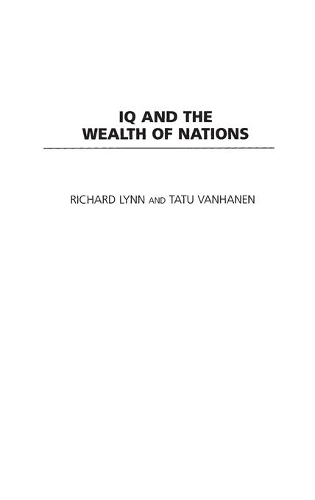
IQ and the Wealth of Nations
(Hardback)
Publishing Details
IQ and the Wealth of Nations
By (Author) Richard Lynn
By (author) Tatu Vanhanen
Bloomsbury Publishing PLC
Praeger Publishers Inc
28th February 2002
United States
Classifications
Tertiary Education
Non Fiction
330.019
Physical Properties
Hardback
320
Width 156mm, Height 235mm
595g
Description
This work tests the hypothesis on the causal relationship between the average national intelligence (IQ) and the gap between rich and poor countries by empirical evidence. Based on a survey of national IQ tests, their results challenge previous theories of economic development and provide a new basis to evaluate the prospects of economic development throughout the world. They begin by reviewing and evaluating some major previous theories. The context of intelligence is then described and IQ introduced. Next they show that intelligence is a significant determinant of earnings within nations, and they connect intelligence with various economic and social phenomena. The sociology of intelligence at the level of sub-populations in nations is examined, and the independent (national IQ) and dependent (various measures of per capita income and economic growth rates) variables are defined and described. They then provide empirical analyses starting from the 81 countries for which direct evidence of national IQ is available; the analysis is then extended to the world group of 185 countries.
Reviews
"Endorsement From J. Phillippe Rushton Fellow, John Simon Guggenheim Foundation Professor of Psychology, University of Western Ontario: [A] brilliant integration of economics and psychology that illuminates the nexus between mental ability on the one hand, and national wealth, industrial productivity, and well being, on the other. This is a book that social scientists, policy experts, and global investment analysts cannot afford to ignore....Richard Lynn and Tatu Vanhanen's thesis is stunningly engineered to allow for no error of inference and no possible outcome than the correct one, strangely overlooked until now...IQ and the Wealth of Nations does for the study of human diversity and achievement among nations what The Bell Curve did for IQ and achievement in the USA.
Author Bio
RICHARD LYNN is Professor Emeritus of Psychology, University of Ulster, Northern Ireland. Now with the Whitfield Institute, among Professor Lynn's earlier publications are Dysgenics (Praeger, 1996) and Eugenics (Praeger, 2001). TATU VANHANEN is Professor Emeritus, Department of Political Science, University of Tampere and Docent Emeritus, Department of Political Science, University of Helsinki, Finland. The author of four earlier books, he concentrates on the comparative study of democratization, evolutionary roots of politics, and ethnic nepotism and conflicts.
